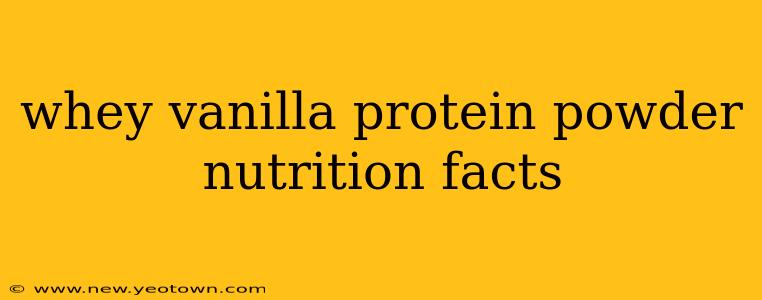Let's be honest, the world of protein powder can feel like a jungle. So many brands, so many flavors, so many…numbers. But understanding the nutritional facts of your whey vanilla protein powder isn't just about crunching numbers; it's about fueling your body effectively. This detailed look into the nutritional breakdown of whey vanilla protein powder will help you navigate this nutritional landscape with confidence. We'll explore the typical macronutrients, delve into potential micronutrient benefits, and address common questions surrounding this popular supplement.
What are the typical macronutrients in whey vanilla protein powder?
This is the bread and butter of protein powder nutrition. The macronutrient profile typically centers around protein, carbohydrates, and fats. While exact numbers vary slightly between brands and formulations, you can expect to see something like this per serving (usually around one scoop):
-
Protein: This is the star of the show, usually ranging from 20-30 grams per serving. Whey protein is a complete protein, meaning it contains all nine essential amino acids your body needs but can't produce on its own. This makes it excellent for muscle growth and repair.
-
Carbohydrates: The carbohydrate content is typically lower, often ranging from 1-5 grams per serving. These carbs come from naturally occurring sugars in the whey or added ingredients.
-
Fats: The fat content is generally low, often less than 5 grams per serving. These fats are predominantly healthy fats.
It's crucial to check the specific nutritional label of your chosen brand as formulations can vary. Some brands opt for added ingredients that might increase the carbohydrate or fat content slightly.
Does whey vanilla protein powder contain any vitamins and minerals?
While not a primary source of vitamins and minerals, whey protein powder can contribute to your daily intake. Many brands fortify their products with additional vitamins and minerals, enhancing the nutritional profile. However, this isn't universally true – don’t assume all brands add extra nutrients. Always refer to the nutrition label for specifics. Expect to possibly find trace amounts of things like calcium, vitamin B, and other trace minerals. However, rely on a balanced diet as your primary source of micronutrients, not solely your protein powder.
How many calories are in a serving of whey vanilla protein powder?
The calorie count varies greatly depending on the brand, serving size, and added ingredients. A typical serving might range anywhere from 100 to 150 calories. However, it is essential to check the nutrition label on your specific product; this is not a one-size-fits-all answer.
Is whey vanilla protein powder a good source of fiber?
Generally, no. Whey protein powder is not a significant source of fiber. The fiber content is typically minimal, usually less than 1 gram per serving. If fiber is a primary concern, focus on incorporating fiber-rich foods into your overall diet.
What are the potential benefits of using whey vanilla protein powder?
Many people use whey protein powder to support muscle growth, aid in recovery after workouts, and increase their overall protein intake. It’s convenient, easy to add to smoothies or other recipes, and a relatively cost-effective way to boost protein consumption.
Remember, this information is for general guidance only. Always refer to the specific nutritional information provided on the packaging of the whey vanilla protein powder you are using. Consulting with a registered dietitian or healthcare professional is recommended, especially if you have specific dietary needs or concerns.

